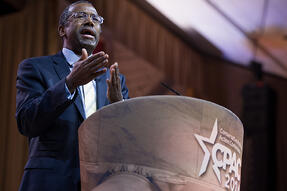Though the calendar may have just rolled over to 2015. We already have the first plagiarism controversy of the 2016 election.
Earlier this month Buzzfeed highlighted passages in Ben Carson’s 2012 book “America the Beautiful” that appeared to be lifted from other sources. Though some of the passages contained heavy rewriting, many were lifted verbatim.
According to Buzzfeed, many of these sources Carson pulled from were cited in the endnotes, but there was no indication that the passages were quotes or near quotes.
Carson, a Republican, is widely considered to be a likely candidate for the 2016 election. His book did not initially sell well, selling only about 1,000 in copies in 2012. But in 2013, Carson gave a speech at the National Prayer Breakfast that caused his political star to rise as well as sales of his book, over 46,000 copies sold in six weeks.
Carson almost immediately issued an apology for the plagiarism, saying that, “I attempted to appropriately cite and acknowledge all sources in America the Beautiful, but inadvertently missed some. I apologize and I am working with my editors to rectify the situation.”
Carson’s publisher, Zondervan, a Christian imprint of HarperCollins, has said that they are planning on correcting the citation issues in further reprints.
However, Carson also had his defenders, including William Federer, one of the authors he is accused of plagiarizing. In a statement to CNN, Federer said that he gave permission to use the materials in the book and approved the final product.
He went on to say that Carson provided 16 different acknowledgements and citations in Carson’s book saying that, “Dr. Ben Carson has made demonstrable efforts to make proper attribution.”
But while the allegations and responses are interesting, they likely will have little to no impact on the election. Carson is likely months away from any formal announcement on his candidacy. The allegations come far too early in the election cycle and are relatively minor in nature to have a serious impact on the outcome of even the primaries.
Still, it seems likely his political opponents will be quick to mention the allegations of plagiarism, whether or not they move the dial with voters.
What is most interesting about this story is that it is, most likely, a preview of what we’re going to see in 2015 and 2016 with regards to plagiarism allegations. Buzzfeed, other news organizations, citizens journalists and political opponents alike will be digging through every candidate’s history to find any instance of plagiarism that they can use.
While we got a glimpse of this with the 2014 elections, as the Presidential election begins to take shape, expect to see more and more allegations like this one made. The allegations will likely come from a variety of sources, with citizen journalists and online media organizations taking the lead.
The question is what, if any, impact these allegations will have. We saw the impact of a significant and well-timed allegation with Senator John Walsh, but as a recent article on Bloomberg highlighted, the outcome of plagiarism allegations in politics depend heavily on the nature and the timing of the allegations.
As we get closer into the primaries, we’ll likely see more plagiarism drama unfold, possibly with a much greater impact on the political landscape.